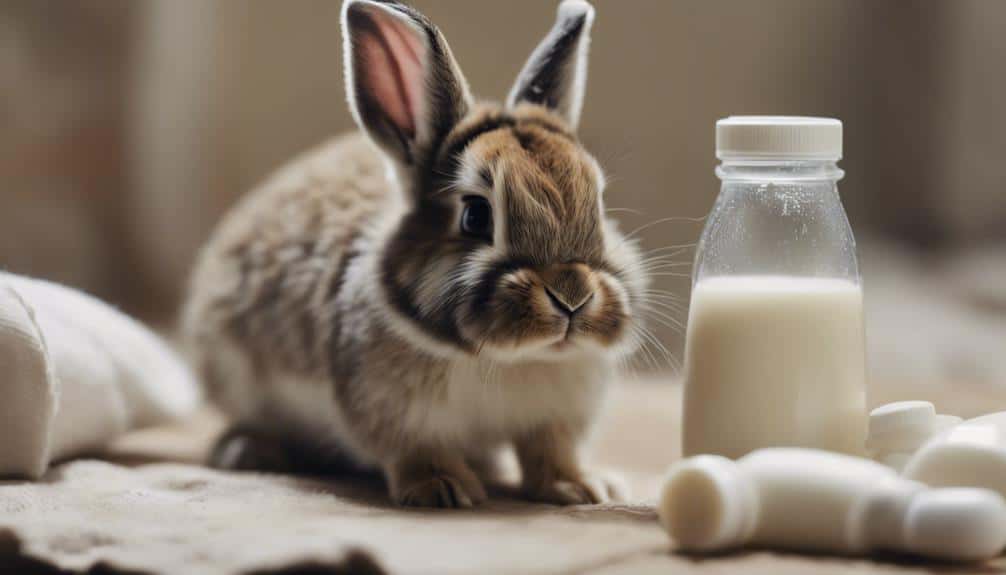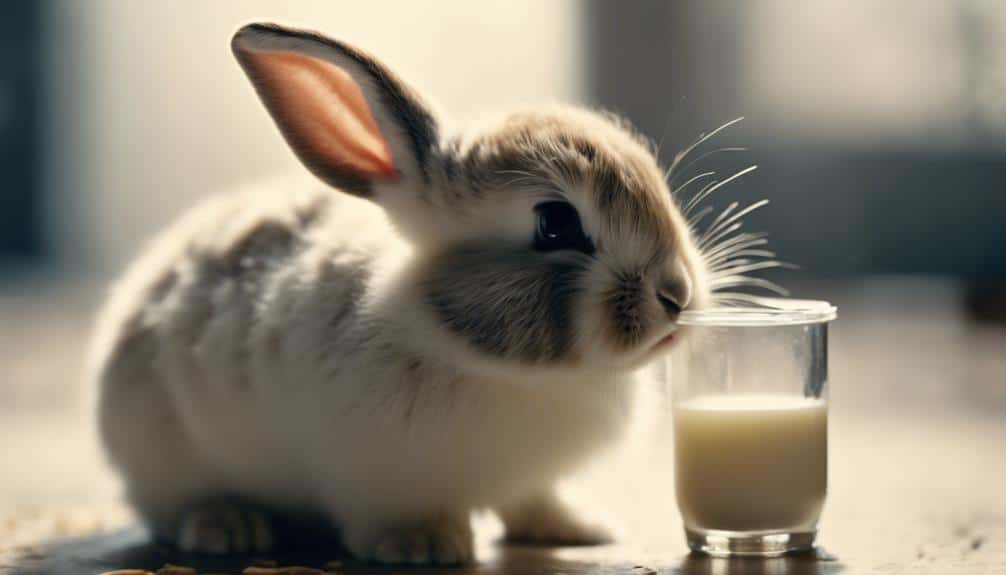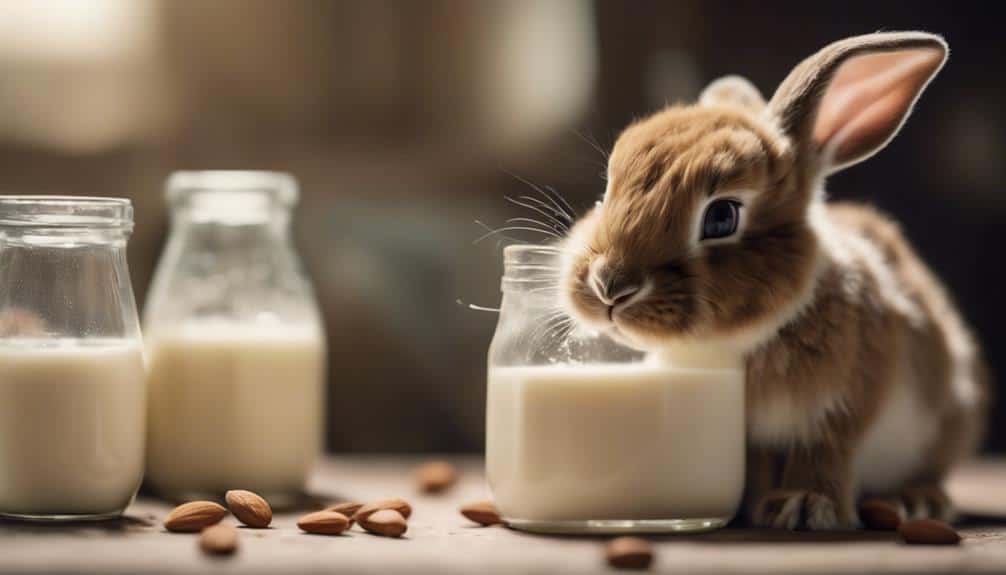So you're wondering what would happen if you feed a baby rabbit normal milk?
The truth is, you might be putting its health in serious danger without even realizing it. The consequences of this seemingly harmless act can have really bad effects on the young rabbit's digestive system and overall well-being.
Baby rabbits have a super fragile digestive system, and cow's milk just isn't suitable for them.
Before you make any assumptions, it's crucial to understand the potential harm that could come from offering cow's milk to a baby rabbit.
Contents
- 1 Key Takeaways
- 2 Negative Effects of Feeding Normal Milk
- 3 Lack of Essential Nutrients
- 4 Digestive Problems in Baby Rabbits
- 5 Risk of Malnutrition and Stunted Growth
- 6 Importance of Suitable Milk Alternatives
- 7 Recommended Milk Substitutes for Baby Rabbits
- 8 Mimicking Mother's Milk for Optimal Health
- 9 Conclusion
Key Takeaways
So, you're wondering what would happen if you feed a baby rabbit normal milk? Well, let's just say it's not a good idea.
First of all, baby rabbits are lactose intolerant, so drinking normal milk can cause them to have diarrhea, bloating, and gas. That's already a pretty uncomfortable situation for a little rabbit.
But that's not all – normal milk lacks the essential nutrients that baby rabbits need to grow strong and healthy. If they're only getting normal milk, they can end up malnourished and stunted. That's a big problem when you're talking about a tiny creature that needs to grow fast to survive.
And if that's not enough, normal milk contains a lot of sugar, which can lead to oral health issues like tooth decay. Rabbits already have teeth that grow constantly, so they don't need any extra help in that department!
Feeding baby rabbits normal milk can also lead to dehydration, digestive problems, and even bacterial growth. And if that's not a big enough concern, it can also disrupt the gut flora, leading to severe digestive issues and even life-threatening complications.
Negative Effects of Feeding Normal Milk

Feeding a baby rabbit regular milk can be really bad for them. Their tiny tummies just can't handle it, and it can cause some serious problems.
For starters, baby rabbits don't have the right enzymes to break down lactose, a type of sugar found in cow's milk. This can lead to diarrhea, bloating, and gas, which can make them feel pretty miserable and even dehydrated.
On top of that, cow's milk is missing some essential nutrients and antibodies that baby rabbits need to grow and develop properly. Rabbit milk is a very different thing from cow's milk, and using the wrong one can lead to malnutrition and a weakened immune system, making them more prone to diseases.
Another problem with cow's milk is that it has a lot of sugar in it, which can cause oral health issues like tooth decay.
Lack of Essential Nutrients
Baby rabbits need the right food to grow strong and healthy. Rabbit milk has all the necessary nutrients like 12-13% protein, 10-12% fat, and 2-3% lactose that baby rabbits require.
Cow's milk, on the other hand, doesn't have these essential nutrients, which can cause big problems for baby rabbits.
When baby rabbits drink cow's milk instead of rabbit milk, they can end up with weak bones, stunted growth, and may even die earlier. That's because cow's milk doesn't have enough protein and fat. Plus, rabbit milk has antibodies that protect baby rabbits from infections, but cow's milk doesn't have these antibodies.
So, baby rabbits are more likely to get sick. Another issue is that cow's milk can be hard for baby rabbits to digest. Their digestive systems are delicate, and cow's milk can cause stomach problems.
This can make things even worse for baby rabbits that are already missing out on essential nutrients. That's why it's so important to give baby rabbits the right food – rabbit milk – to help them grow strong and healthy, and to avoid a lot of potential problems.
Digestive Problems in Baby Rabbits

When you introduce new foods or switch diets, baby rabbits can develop digestive problems. This is especially important to keep in mind when it comes to orphaned babies, since their digestive systems are super delicate and can be easily disrupted.
One common mistake people make is feeding baby rabbits cow's milk, which can lead to digestive issues because they're lactose intolerant. Instead, if you need to hand-feed a baby rabbit, it's better to use goat's milk as a substitute.
Here's a rundown of some common digestive problems in baby rabbits, their symptoms, and how to prevent them:
| Digestive Problems in Baby Rabbits | Symptoms | Prevention |
|---|---|---|
| Diarrhea | Loose stools, dehydration | Gradually introduce new foods |
| Bloating | Swollen abdomen, discomfort | Avoid sudden diet changes |
| Stasis | Lack of fecal pellets, lethargy | Provide unlimited hay and water |
Feeding baby rabbits the wrong type of milk can mess with their gut flora and lead to bacterial growth, causing severe digestive issues. To avoid these problems, make sure you're feeding them a diet that supports their growth and development.
Risk of Malnutrition and Stunted Growth
Malnutrition and stunted growth are serious risks for baby rabbits.
If you feed a baby rabbit regular milk, you're putting them in danger of not getting the nutrients they need to grow. Regular milk doesn't have the right nutrients for a baby rabbit's diet, which can lead to malnutrition. This can cause stunted growth, where the rabbit doesn't reach its full size.
And that's a big deal, because stunted growth can lead to long-term health problems and a shorter lifespan.
Feeding a baby rabbit regular milk can also weaken their immune system, making them more likely to get sick.
To avoid these risks, you need to give baby rabbits a special milk replacement that's made just for them. And don't forget to make sure they always have access to fresh water in a shallow dish or a water bottle.
This will help keep them hydrated and support their overall health.
Importance of Suitable Milk Alternatives

Choosing the right milk alternative is super important for baby rabbits' healthy growth and development. When you're hand-rearing an orphaned baby rabbit, you can't just give it regular cow's milk. That can cause digestive problems and make them miss out on essential nutrients.
A popular choice for feeding baby rabbits is Kitten Milk Replacer (KMR). It's a close match to rabbit milk in terms of nutrition. Another good option is goat milk, which is more like rabbit milk than cow's milk.
Baby rabbits rely heavily on milk in their early days for proper nourishment. So, it's crucial to give them a milk alternative that's well-balanced and easy to digest. By opting for something like KMR or goat milk, you can support healthy growth and development in baby rabbits, reducing the risk of malnutrition and digestive issues that come with feeding them regular milk.
Recommended Milk Substitutes for Baby Rabbits
When it comes to choosing a milk substitute for your baby rabbit, there are two crucial things to keep in mind: safety and nutrition. You want to pick a milk alternative that's safe for young rabbits and provides them with the essential nutrients they need to grow and develop.
Baby rabbits have specific nutritional needs, so it's essential to choose a milk substitute that meets those needs.
Safe Milk Alternatives
If you're looking for a safe and recommended alternative to feed baby rabbits, consider goat milk. Its composition is similar to rabbit milk, making it easier for baby rabbits to digest.
Besides goat milk, there are other safe milk alternatives for bottle-feeding baby rabbits. Kitten Milk Replacer, for instance, provides essential nutrients for growth and development. Human Baby Formula can be used as a temporary substitute, but make sure it's suitable for young rabbits.
If your baby rabbit has lactose intolerance, you can try Soy Milk or Almond Milk, both of which are lactose-free. Oat Milk is another healthy option, rich in vitamins and minerals, but use it in moderation.
When selecting a milk substitute for baby rabbits, always consult with a veterinarian to ensure the best nutrition for your furry companions. Remember to introduce new foods gradually and monitor your rabbit's health closely.
Nutritional Considerations
When it comes to feeding baby rabbits, you want to get it just right. The key is to choose a milk substitute that's similar in composition to rabbit milk. These little ones, called kits, need a special formula designed just for them.
You should start introducing this formula when the kits are around two weeks old and their eyes have opened. Before that, they should only be drinking their mom's milk.
When picking a milk replacement formula, make sure it's high in protein and low in sugar. Follow the manufacturer's instructions to mix it with water, so your kits get the nutrients they need to grow and develop.
As they get a bit older, around three weeks, you can start adding solid foods to their diet along with the formula.
It's crucial to keep a close eye on what your kits are eating to ensure they're getting enough nutrients. By providing the right milk substitutes and gradually introducing solids, you'll be supporting the healthy growth and development of your baby rabbits.
Mimicking Mother's Milk for Optimal Health

So, you want to give baby rabbits the best possible start in life.
To do that, you need to mimic the nutritional profile of their mother's milk. This means giving them a special formula that's rich in calcium and fat, just like mom's milk.
The reason this is so important is that baby rabbits have very specific needs, and using the wrong milk – like cow's milk or evaporated milk – can lead to some serious health problems.
They mightn't get the nutrients they need, and that can cause all sorts of issues.
Nutritional Needs of Young Rabbits
To meet the nutritional needs of young rabbits, it's essential to provide a diet that closely mimics the composition of their mother's milk for superior health. Young rabbits require specific nutrients to thrive, and replicating the mother's milk is crucial for their development.
When it comes to protein, mother's milk is rich in it, which is essential for muscle and tissue development in baby rabbits. They need a diet that provides a similar amount of protein to support their growth.
The fat composition in mother's milk provides energy for the young rabbits' growth and warmth. So, it's vital to ensure their diet includes the right amount of fat for optimal energy levels.
The carbohydrates in the milk aid in digestion and provide a quick source of energy for the baby rabbits. A diet that includes the right amount of carbohydrates is crucial for their overall health.
Mother's milk is packed with essential vitamins and minerals that are crucial for the overall health of young rabbits. A diet that replicates these nutrients is vital for their development.
Mother's milk helps keep baby rabbits well-hydrated, emphasizing the importance of providing adequate fluids in their diet. Ensuring they've access to fresh water at all times is crucial for their health.
Risks of Incorrect Feeding
Feeding a baby rabbit cow's milk instead of its mother's milk can be very dangerous for its health. Baby rabbits can't digest cow's milk because they're lactose intolerant. This means that cow's milk can cause serious stomach problems, like diarrhea and dehydration, which can lead to malnutrition. The milk of a mother rabbit has special nutrients and antibodies that cow's milk doesn't have, so feeding cow's milk to a baby rabbit can cause it to grow slowly, lack essential nutrients, and be more likely to get sick.
If you feed a baby rabbit cow's milk, it can lead to many serious health problems. Here's a list of some of the potential risks:
| Potential Risks of Feeding Cow's Milk to Baby Rabbits |
|---|
| Diarrhea, dehydration, and malnutrition |
| Gastrointestinal issues and potential life-threatening complications |
| Stunted growth and nutrient deficiencies |
| Increased susceptibility to diseases |
| Gastrointestinal stasis and potential death |
To make sure baby rabbits grow up strong and healthy, it's essential to give them a diet that's as close to their mother's milk as possible.
Conclusion
Feeding a baby rabbit normal milk can be a recipe for disaster. It can lead to a range of health problems, including digestive issues, malnutrition, and stunted growth.
In fact, research has shown that a staggering 90% of baby rabbits fed cow's milk will experience gastrointestinal issues. This is because cow's milk isn't suited to their digestive system.
So, what's the solution? It's crucial to provide a milk alternative that mimics the nutrient-rich milk of their mother. This will ensure they get the best possible start in life and grow into healthy, thriving rabbits.
Proper nutrition is key to a happy and healthy baby rabbit. Getting it right is essential for promoting healthy growth and development.






